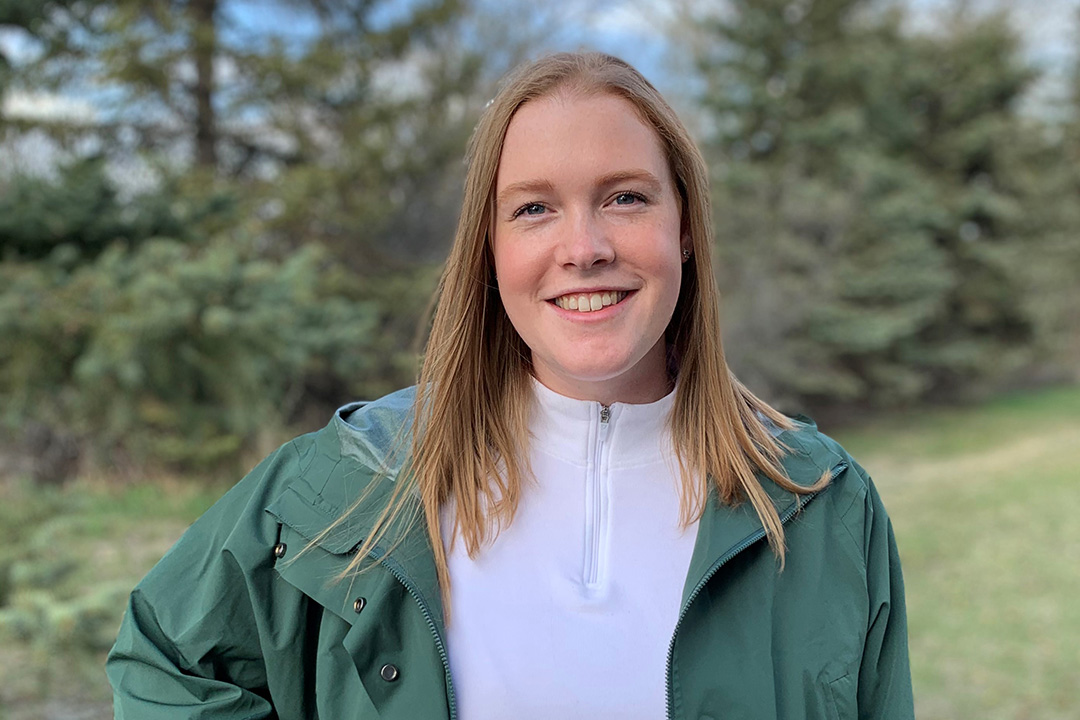
Music’s connection to wellness and wellbeing fascinates new USask graduate
For musician Sophia James-Cavan, receiving her undergraduate degree from the University of Saskatchewan (USask) is a “bittersweet” milestone.
By Shannon Boklaschuk“The University of Saskatchewan and the Department of Music hold a special place in my heart and, while it feels incredible to have finished, I will miss being a student at USask,” she said.
James-Cavan, who was born in Saskatoon and raised on acreage just east of the city, began her studies at USask in 2017 after graduating from Clavet Composite School. She is now set to receive a Bachelor of Music (individualized) degree during USask’s 2021 Spring Convocation.
“Music has always been a core part of my identity. I began music classes at two years old, so I’ve never really known a life away from it,” she said.
“Throughout high school I was a member of the Saskatoon Children’s Choir, a member of the Prairie Spirit (East) School Division Band, and I played a starring role—Annie—in the Clavet Composite School production of Annie. I began teaching piano, guitar and voice in my last years of high school, and I knew sharing music was something I wanted to pursue further.”
Piano was James-Cavan’s instrument of study at USask, but she also sings and plays the guitar, ukulele and flute. During her undergraduate studies she was awarded the Eleanor Magel (Staflund) Kirk Bursary in Music, and she was a member of the Greystone Singers throughout the four years of her degree. This past year, she also served as the fundraising coordinator on the executive team and as a section leader for the Alto 2 section.
In 2020, before the COVID-19 pandemic hit Saskatchewan, James-Cavan was a member of Timeless Voices, an intergenerational choir at the Sherbrooke Community Centre. Along with other USask students, she also founded The Harmony Collective, an organization that currently brings student musicians—virtually—into isolated parts of the community. The organization provides free access to music and entertainment to vulnerable populations, such as care-home residents.
For James-Cavan, the best part of studying at USask was “the diversity offered in courses, which facilitates exploration within classes,” she said.
“The diversity promoted in the courses offered at USask celebrates exploration and creative thinking. For example, I took a course called Music and the Supernatural. This unique subject matter broadened my understanding of music and allowed me to explore music beyond what I would have ever expected.”
James-Cavan is currently helping to organize the Music and Wellbeing Conference, which will be hosted by the Department of Music on May 28 and 29, 2021. The online conference will unite researchers, community partners, educators, university students and health-care providers to explore and examine music and health intersections and facilitate knowledge mobilization of music’s role and relevance in our lives during the best and worst of times.
“I first wanted to be involved with the Music and Wellbeing Conference because of my plan to pursue music therapy. I am fascinated by the connection that music has to wellbeing and wellness,” James-Cavan said. “The need for (the) music and wellbeing discussion has been undeniably illuminated by the pandemic, and being able to work on such an important topic has been incredible.”
With her Bachelor of Music degree now complete, James-Cavan plans to pursue graduate studies in music therapy at Concordia University in Montreal. She has some advice for new students who are just beginning their studies at USask.
“My biggest piece of advice would be to allow yourself to make mistakes and be kind to yourself as you learn in this new environment and find your academic footing,” she said.
While James-Cavan is moving on to the next step of her educational journey, she will have fond memories of her time at USask. The Department of Music will have a place in her heart, as will the connections she made there.
“One of the most inspiring things about the Department of Music is found in the strong community of students and professors,” she said. “The small class sizes facilitate student learning brilliantly, and the tight-knit student community is something I am proud to be a part of.”

